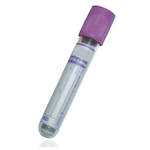Suitable Specimen Types
- Serum
- EDTA Plasma
- Li Hep Plasma
Specimen Transport
First class postSample Processing in Laboratory
Place sample in toxicology rack.Sample Preparation
None requiredTurnaround Time
3 days.Sample Stability
Keep refrigerated. 4 degrees.Diphenhydramine
General Information
Diphenhydramine (Benadryl, Nytol, ingredient of Benylin, Panadol) was one of the first effective antihistamine agents discovered. The compound is also used for its sedative and antiemetic effects. A wide variety of over-the-counter preparations in the form of tablets, capsules, elixirs, creams and gums contain 12 - 50 mg diphenhydramine per dose, often in combination with analgesics and decongestants. The 8-chlorotheophyllinate salt is a nonprescription drug known as dimenhydrinate (Dramamine) and is a popular remedy for motion sickness.
Diphenhydramine is often considered to be a relatively non-toxic drug, although a number of cases of intoxication due to overdosage have been described. These have usually involved infants who ingested 100 - 500 mg of the drug and who exhibited muscle tremors, anxiety, disorientation, hallucinations, loss of consciousness, seizures, gever, respiratory arrest and cardiac arrhythmia.
Patient Preparation
For TDM, sample should be taken prior to dose. If toxicity is suspected, take sample at earliest opportunity
Notes
Diphenhydramine measured by HPLC-DAD.
Reference Range
High dose therapeutic use of diphenhydramine associated with concentrations of up to 0.3 mg/L. Toxicity associated with concentrations > 1 mg/L. (Schulz et al. Critical Care 2012, 16:R136).
Specifications
- EQA Scheme?: Yes
- EQA Status: LGC QUARTZ, LGC CLIN TOX
